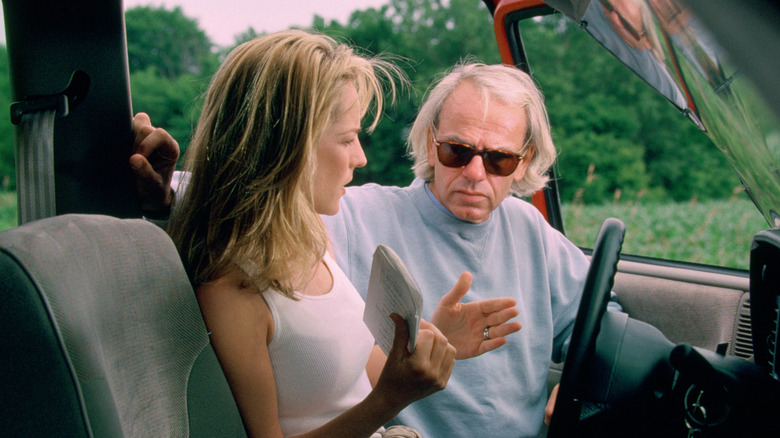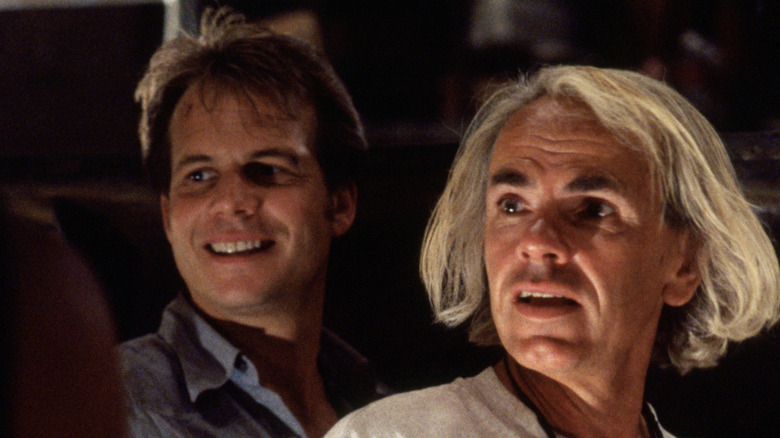Twister's Jan De Bont Never Considered Making A Sequel: 'What Would The Sequel Be? Even Bigger Tornadoes?' [Exclusive]
We're fond of pointing out that Hollywood is run by a bunch of risk-averse studio executives who take any opportunity they can to double down on the success of an existing property instead of taking a chance on something original. But while that is indeed the pervasive mentality dominating the mainstream American film industry right now, there are a handful of times where studios have not been able to immediately go back to the well and milk an idea dry. The most recent and high-profile example is "Barbie," which was a global sensation and the highest-grossing film of 2023 (not to mention the highest-grossing movie in Warner Bros. history), and as of this writing, we still haven't heard anything concrete about a possible "Barbie 2."
Another example: Jan de Bont's "Twister" was the second highest-grossing film of 1996, but it's taken almost 30 years for a sequel to make its way to theaters. ("Twisters," which appears to have only loose connections to the original film, opens this month.) But perhaps part of the reason Warner Bros. didn't immediately jump into developing "Twister 2" after the first film's massive success (again, it out-grossed films like "The Rock" and "Mission: Impossible") is because its director always viewed it as a one-off.
I recently spoke with de Bont to celebrate today's 4K UHD release of "Twister" on disc and Digital, and asked if he and the studio had any conversations about a possible sequel in the aftermath of the film's huge success:
"No, there was actually ... not right then. Because the studio was actually shocked how well it opened. They couldn't believe it. They kept calling me saying, 'This is so great!' and I was, of course, extremely happy with it too. But I thought of it as a one-time movie. I didn't even think about a sequel. I mean, what would the sequel be? Even bigger tornadoes? You can't get much bigger, you know? [laughs]"
Jan de Bont needed Twister to feel real
In my full conversation with de Bont, which you can hear on today's episode of the /Film Daily podcast, the director hammers home the point that he wanted to create an immersive experience with "Twister" so the audience could feel as if they were right there with the film's characters. Part of the way he went about achieving that was to create an environment on set with multiple cameras going at once so he could capture genuine reactions from stars Bill Paxton and Helen Hunt as they were in the midst of the large-scale weather-centric action scenes. But even de Bont knows that there's a breaking point when it comes to going too big in a story like this:
"Like, 15 years later, there was a project written about a super F5 tornado. When it gets down to that, I'm always suddenly feeling a little hesitant. Then it becomes a little bit more like too imaginary, too fanciful, and too over the top. ["Twister"] was not like that. It had to be much more real."
It's unclear if that quote contains a reference to a possible draft of a "Twister" sequel that never saw the light of day, or if he was talking about the found-footage tornado movie "Into the Storm" from 2014.
But even if de Bont wasn't interested in a follow-up, one person from the original production was: Bill Paxton. In 2012, Paxton said he wanted to direct a "Twister" sequel that would have been a generational story of his and Helen Hunt's characters passing the baton to their daughter as they track a gigantic storm similar to the real-life Tri-State Tornado from 1925. You can read much more about his vision in our article, but it's a shame he passed away before he got to try his hand at tackling that story.
In any case, you can listen to Jan de Bont talk all about the making of "Twister" in our interview below:
You can subscribe to /Film Daily on Apple Podcasts, Overcast, Spotify, or wherever you get your podcasts, and send your feedback, questions, comments, concerns, and mailbag topics to us at bpearson@slashfilm.com. Please leave your name and general geographic location in case we mention your e-mail on the air.

